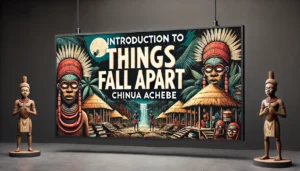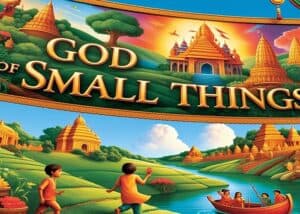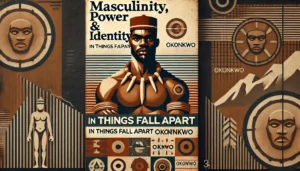Women in Things Fall Apart
Chinua Achebe’s Things Fall Apart presents a deeply patriarchal Igbo society, where women are often seen as subordinate to men. However, despite their limited political and social power, women play crucial roles in Igbo culture, family life, and spirituality. Through the depiction of women in Things Fall Apart, Achebe highlights the complexities of gender roles, the significance of motherhood, and the balance between femininity and societal expectations.

Role of Women in Igbo Society
Igbo society, as portrayed in Things Fall Apart, is structured around male dominance. Men control leadership, warfare, and decision-making, while women are expected to take care of the household and raise children. However, the novel also reveals that women are not entirely powerless and that their influence extends beyond their expected domestic roles.
1. Women as Caretakers and Nurturers
- Women in Igbo society are primarily responsible for raising children, preparing food, and maintaining the household.
- They ensure the survival and continuity of the family by instilling traditions and values in their children.
- Okonkwo’s wives—Nwoye’s mother, Ekwefi, and Ojiugo—demonstrate the strength required to run a household despite Okonkwo’s temper and harsh treatment.
2. Spiritual and Religious Roles
- Women play a central role in religious traditions. The Oracle of the Hills and Caves, Agbala, is a female deity, showing that women have spiritual power.
- Chielo, the priestess of Agbala, holds a highly respected position in the village. She can even command Okonkwo, a man who rarely listens to anyone.
- This highlights the paradox within Igbo culture: while women are excluded from political power, they hold spiritual and supernatural authority.
3. Women as Symbols of Peace
- Igbo society views women as symbols of peace and life.
- For example, when a woman from Umuofia is killed by another village, the elders demand a virgin girl as compensation, symbolizing the restoration of peace.
- Additionally, mothers are seen as protectors, as reflected in the Igbo saying: “Mother is supreme”—a reminder that a mother’s homeland is always a place of refuge.
Motherhood and Its Power
Motherhood is one of the most respected roles for women in Things Fall Apart. Women are expected to bear children and ensure the continuation of the family lineage.
1. The Emotional Strength of Mothers
- Okonkwo’s motherland provides him comfort and support when he is exiled, reinforcing the idea that the mother’s home is a place of safety and belonging.
- Despite being seen as weak in public life, women play a strong role in private, emotional matters.
2. Ekwefi’s Devotion as a Mother
- Ekwefi’s story reflects a mother’s resilience and suffering. After losing nine children, she dedicates her life to protecting her only surviving daughter, Ezinma.
- She follows Chielo into the dark forest when the priestess takes Ezinma away, showing a mother’s fearless love and determination.
- Ezinma is special because Okonkwo sees her as possessing the qualities of a son, proving how much value is placed on masculinity.
3. Nwoye’s Mother and Compassion
- Nwoye’s mother, though unnamed, plays a quiet but essential role in nurturing Nwoye.
- She helps raise Ikemefuna, treating him with warmth and care, unlike Okonkwo, who ultimately kills him.
- Her tenderness contrasts with Okonkwo’s strict discipline, making her a counterbalance to toxic masculinity.
Femininity and Its Perceived Weakness
Femininity in Things Fall Apart is often associated with weakness and inferiority, especially in Okonkwo’s worldview.
1. Okonkwo’s Fear of Weakness
- Okonkwo constantly fears being seen as weak, which he equates with being feminine.
- He criticizes Nwoye for enjoying his mother’s folktales, believing that storytelling is a feminine trait that makes boys soft.
- His belief that strength equals masculinity leads to his harsh treatment of women and his ultimate downfall.
2. Women as Property
- In Igbo society, wives are often treated as possessions. Men can have multiple wives, while women have no say in marriage.
- Okonkwo’s wives must obey him, and he beats them without consequence. For example, he nearly kills Ekwefi during the Week of Peace.
3. Igbo Proverbs Reflecting Gender Views
- Many proverbs reinforce gender roles. For instance:
- “No matter how prosperous a man is, if he cannot rule his women and children, he is not a real man.”
- This shows that masculinity is defined by controlling women, rather than by cooperation or mutual respect.
Women and Colonial Disruption
With the arrival of the British, Igbo gender roles begin to shift. Christianity offers an alternative to traditional gender norms, leading to changes in women’s status.
1. Christianity and the Empowerment of Women
- The Christian missionaries reject polygamy and male dominance, offering women a new form of identity.
- Nwoye’s mother and other women join the church because it gives them a voice and a place of belonging.
- The new religion also challenges Okonkwo’s harsh masculinity, making him feel powerless against cultural change.
2. The Silent Strength of Women in Change
- While Things Fall Apart focuses on male characters, women play a subtle but important role in shaping the new society.
- They are the ones who adapt more easily to colonial rule, proving that flexibility and resilience—not just brute strength—are valuable traits.
Conclusion
Achebe’s Things Fall Apart presents a complex picture of women in Igbo society. While they are often marginalized and controlled by men, they also serve as caretakers, spiritual leaders, and sources of emotional strength. Through characters like Ekwefi, Nwoye’s mother, and Chielo, Achebe shows that women, despite their oppression, influence Igbo culture in profound ways.
At the same time, the novel critiques the limitations placed on women and exposes the flaws of a society that equates power with masculinity. With the arrival of colonialism, these gender roles begin to shift, revealing that change is inevitable. Achebe thus presents a rich and nuanced portrayal of femininity, resilience, and the silent power of women in a society undergoing transformation.
#women in Things Fall Apart #women in Things Fall Apart #women in Things Fall Apart #women in Things Fall Apart #women in Things Fall Apart #women in Things Fall Apart #women in Things Fall Apart #women in Things Fall Apart #women in Things Fall Apart #women in Things Fall Apart #women in Things Fall Apart #women in Things Fall Apart #women in Things Fall Apart #women in Things Fall Apart #women in Things Fall Apart #women in Things Fall Apart
Read More
Masculinity in Thing Fall Apart
Colonization and Cultural Clash in Things Fall Apart
Achebe’s Narrative Style in Things Fall Apart
Introduction to Things Fall Apart
Frantz Fanon’s The Wretched of the Earth
Postcolonialism and Resistance
Orientalism and The Colonizer’s Gaze and the Creation of the ‘Other
Plot Construction in Pride and Prejudice
Introduction to Fiction and Non Fiction
Of Death — Francis Bacon (Text)
Of Truth Critical Analysis by Sir Francis Bacon
Of Truth by Francis Bacon Summary
Visit Us on our Facebook Page:






